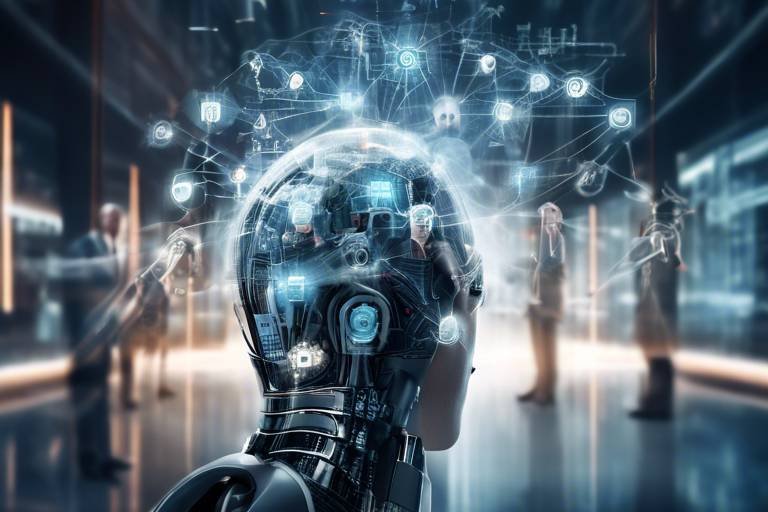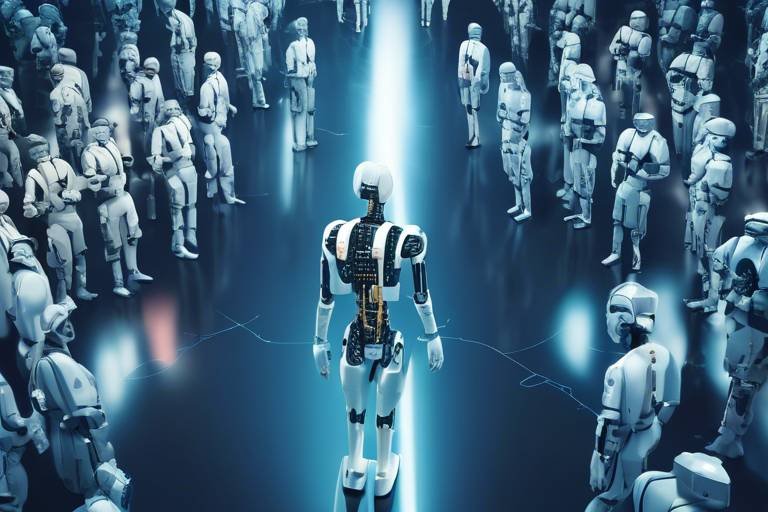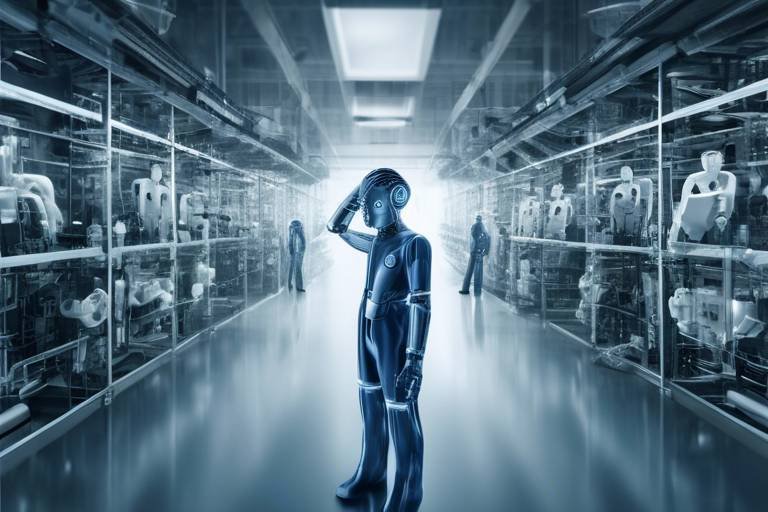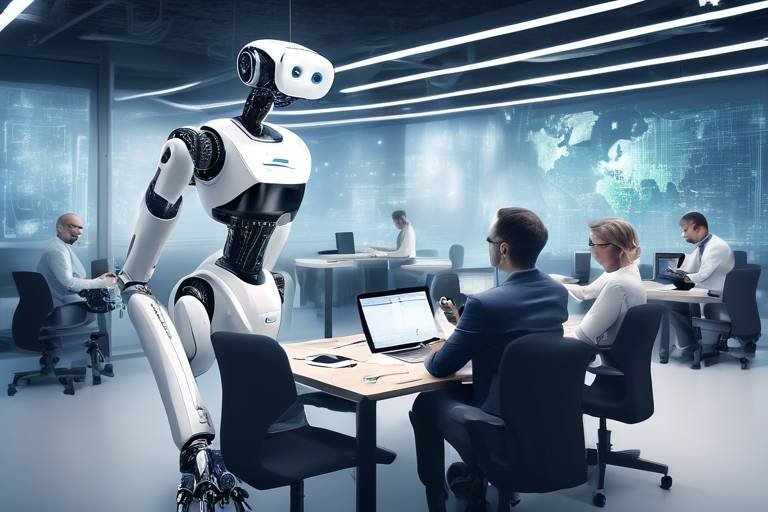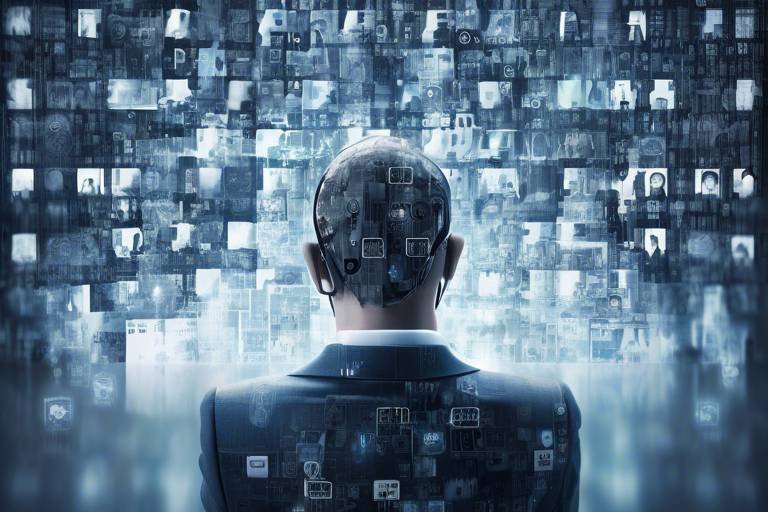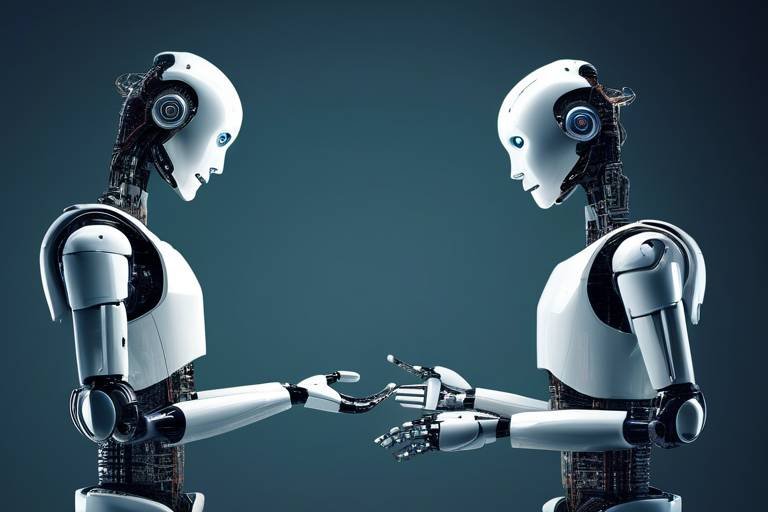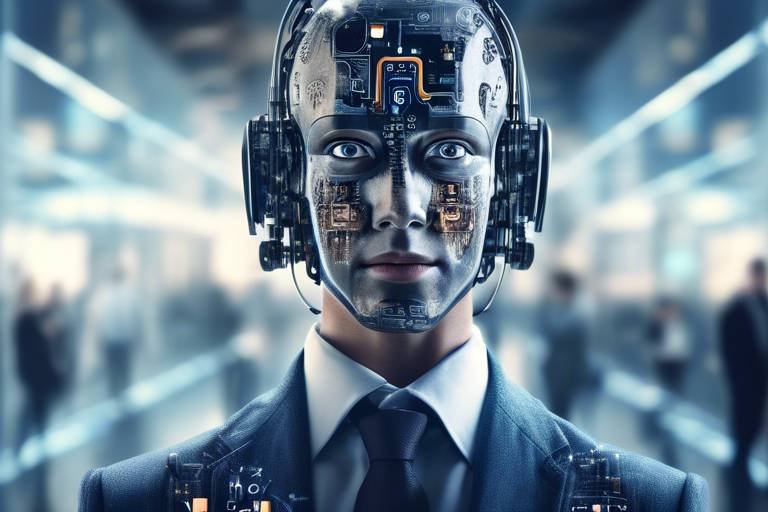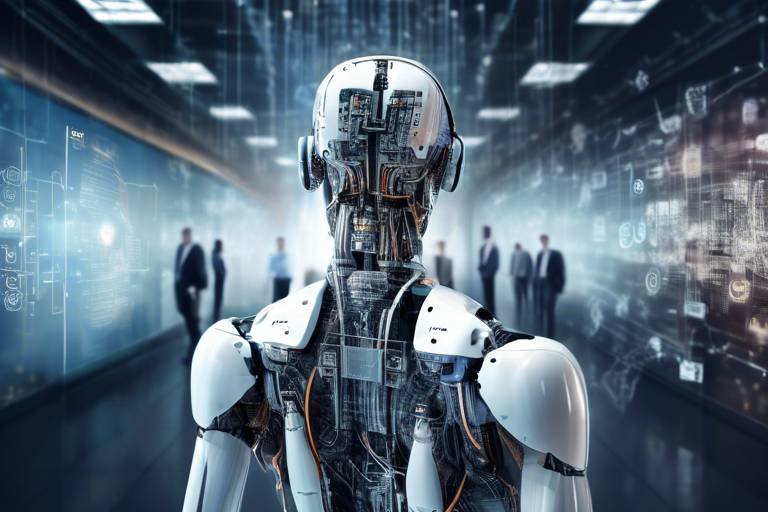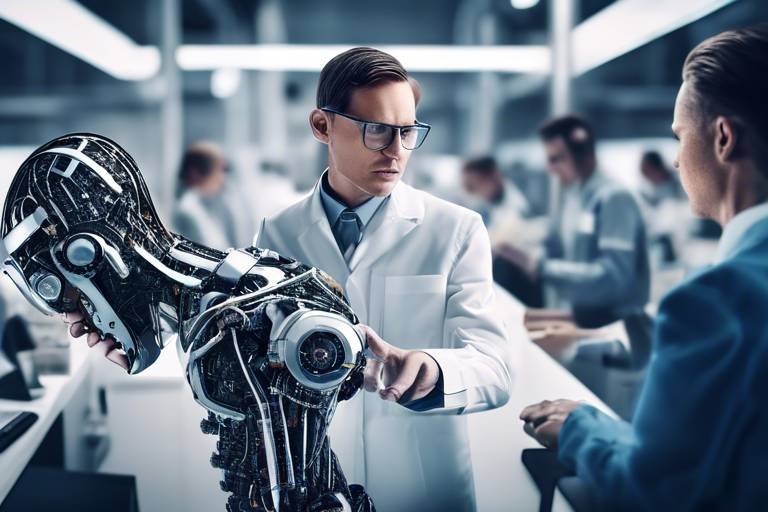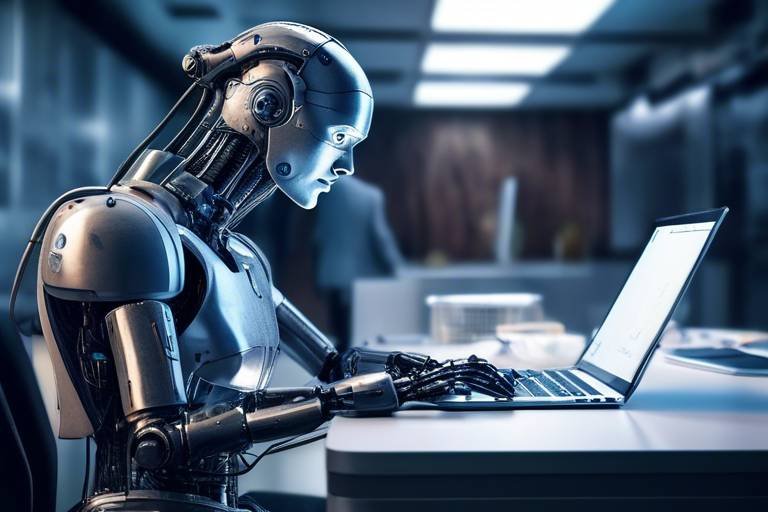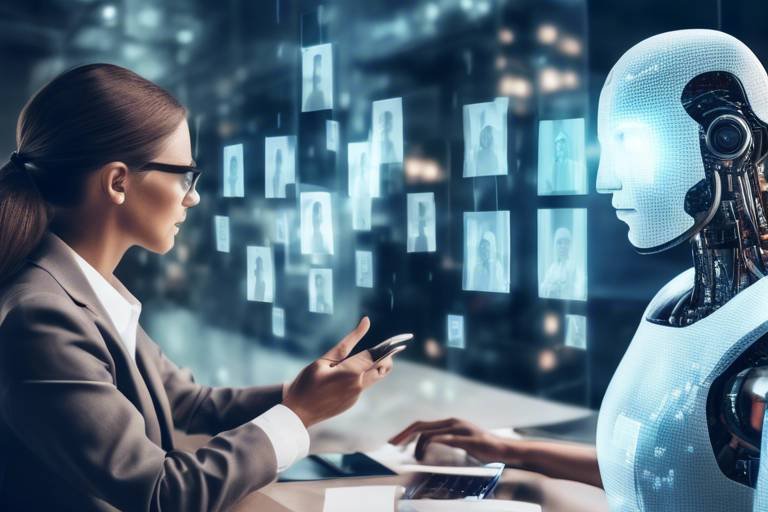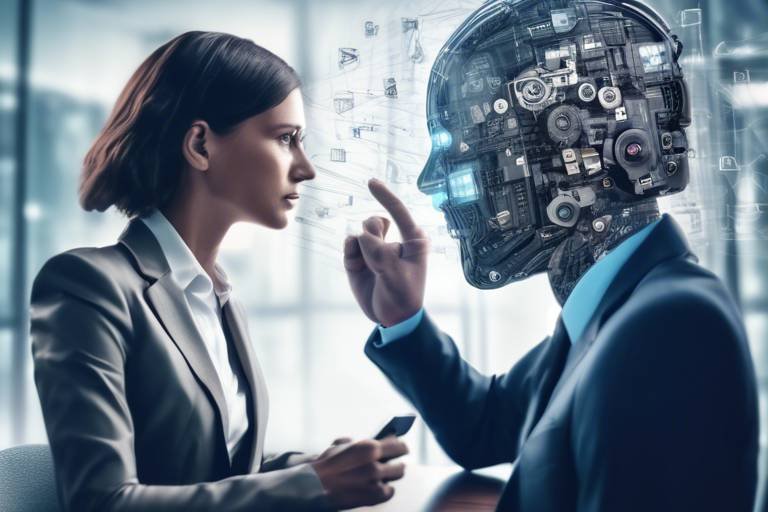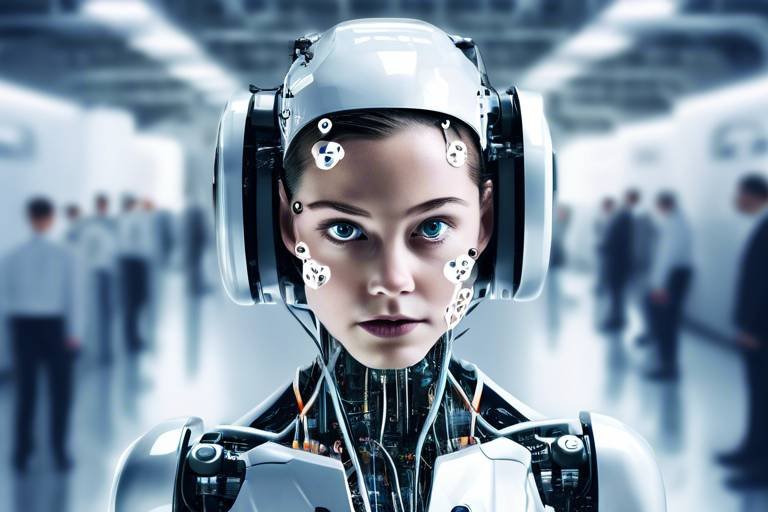Future of Work: Be Prepared for AI Disruptions
As we stand on the brink of a technological revolution, one thing is clear: artificial intelligence (AI) is not just a buzzword; it’s a game-changer in the workplace. Imagine walking into your office and being greeted by a virtual assistant that knows your schedule better than you do, or a system that predicts project outcomes with astonishing accuracy. This is not the future; this is happening now. The integration of AI into various industries is not merely enhancing productivity; it’s reshaping job functions and redefining what it means to work. In this article, we will explore how AI is revolutionizing the workplace, the skills you need to thrive, and strategies to adapt to these rapid changes.
AI technologies are increasingly being woven into the fabric of our daily work lives. From automating mundane tasks to providing deep insights through data analysis, AI is transforming how we approach our jobs. Industries like healthcare, finance, and manufacturing are already experiencing significant shifts as AI tools take center stage. For instance, in healthcare, AI algorithms are assisting doctors in diagnosing diseases with remarkable precision, while in finance, AI is revolutionizing how we analyze market trends and manage investments. Understanding this shift is crucial for anyone looking to future-proof their career. Are you ready to embrace these changes, or will you be left behind?
As AI continues to evolve, certain skills will become more valuable than ever. While technical skills related to AI and data analysis are important, they are not the only skills you should focus on. In fact, critical thinking, creativity, and emotional intelligence will play a crucial role in complementing AI capabilities. Think about it: AI can crunch numbers and analyze data, but it lacks the human touch. This is where your unique abilities come into play. The ability to think critically and creatively will allow you to solve problems that machines can't. Emotional intelligence will help you navigate the complexities of working alongside AI, ensuring that you can lead teams and foster collaboration effectively.
While technical skills related to AI are undeniably important, let’s not forget about the power of soft skills. Communication, teamwork, and adaptability are equally vital in today’s work environment. Think of it this way: technical skills might get you in the door, but soft skills will help you climb the ladder. Balancing these skills can lead to a more adaptable workforce, capable of responding to the ever-changing demands of the job market. In fact, many employers are now prioritizing candidates who can demonstrate a blend of both technical and soft skills. Are you prepared to showcase your full range of abilities?
In a world where change is the only constant, committing to lifelong learning is essential. The job landscape is evolving at breakneck speed, and continuous education and skill development will help you stay relevant and competitive. This doesn’t mean you have to go back to school full-time; it can be as simple as enrolling in online courses, attending workshops, or even participating in webinars. The key is to keep your skills sharp and your knowledge up to date. Remember, the more you learn, the more you earn—and the more valuable you become in an AI-driven economy.
Resilience is key in adapting to AI disruptions. In an environment where change is the norm, cultivating a positive mindset can help individuals navigate uncertainties and embrace change effectively. Think of resilience as your personal toolbox; it equips you with the tools to handle setbacks and challenges with grace. By focusing on developing a resilient mindset, you can turn obstacles into opportunities and ensure that you remain a valuable asset in your organization, no matter what the future holds.
The future of work will likely involve a seamless collaboration between humans and AI systems. This partnership can enhance efficiency and innovation across various sectors. Imagine a world where AI handles repetitive tasks, allowing you to focus on strategic decision-making and creative problem-solving. This collaborative approach not only boosts productivity but also fosters a more engaging work environment. Are you ready to work alongside AI and leverage its capabilities to elevate your career?
Organizations must adapt their structures to accommodate AI technologies. This means fostering an environment that encourages innovation and flexibility in the workforce. Companies that embrace AI will need to rethink their hierarchies and workflows to facilitate collaboration between human employees and AI systems. This shift can lead to more agile operations, enabling organizations to respond swiftly to market demands and technological advancements. The question is, how will your organization adapt to these changes?
Agile teams are essential for responding to rapid changes in the business landscape. These teams prioritize collaboration, flexibility, and customer feedback, allowing them to pivot quickly when necessary. To build and maintain agile teams in an AI-driven world, organizations should focus on fostering a culture of open communication and continuous improvement. This can be achieved through regular team meetings, feedback sessions, and collaborative tools that promote transparency and engagement. Are you part of a team that values agility?
Diversity and inclusion will play a critical role in the success of organizations adapting to AI. A diverse workforce brings a wealth of perspectives and ideas, which can foster innovation and creativity. Companies that prioritize diversity are more likely to develop AI solutions that cater to a broader audience, ultimately leading to better products and services. In an age where AI is reshaping industries, embracing diversity is not just a moral imperative; it’s a business strategy that can drive success.
The job market is evolving due to AI advancements. As traditional roles change or become obsolete, new job roles and industries will emerge. For instance, positions like AI ethicists, data curators, and AI trainers are becoming increasingly relevant. Staying informed about these trends and preparing for the future job market will be crucial for your career trajectory. Are you ready to explore the exciting opportunities that lie ahead?
- What skills should I focus on to thrive in an AI-driven workplace? Focus on a mix of technical skills related to AI, critical thinking, creativity, and emotional intelligence.
- How can I stay relevant in my career as AI continues to evolve? Commit to lifelong learning through online courses, workshops, and networking opportunities.
- What role will collaboration between humans and AI play in the future? Collaboration will enhance efficiency and innovation, allowing humans to focus on strategic tasks while AI handles repetitive ones.
- Why is diversity important in an AI-centric workplace? A diverse workforce fosters innovation and creativity, leading to better products and services that cater to a broader audience.

The Rise of AI in the Workplace
As we step into a new era, it's hard to ignore the **increasing presence of Artificial Intelligence (AI)** in our workplaces. From automating mundane tasks to enhancing decision-making processes, AI is not just a buzzword; it's a transformational force reshaping how we work. Imagine a world where machines can analyze vast amounts of data in seconds, providing insights that previously took teams weeks to uncover. This isn't science fiction—it's happening right now!
AI technologies are being integrated into various industries, fundamentally altering job functions and boosting productivity. For instance, in sectors like healthcare, AI algorithms assist doctors in diagnosing diseases with remarkable accuracy. In finance, AI systems analyze market trends to make investment recommendations. These examples illustrate just a fraction of the potential AI holds in enhancing operational efficiency and driving innovation.
However, with these advancements come significant challenges. The **dynamics of work** are changing, and understanding this shift is crucial for anyone planning their future career. As AI takes over repetitive tasks, the demand for roles that require human creativity, empathy, and critical thinking is on the rise. It's not just about having the right technical skills anymore; it's about adapting to a new way of working that emphasizes collaboration between humans and intelligent systems.
To better understand the impact of AI in the workplace, let’s look at a few key areas where it’s making waves:
- Automation of Routine Tasks: Tasks that were once time-consuming are now automated, allowing employees to focus on more strategic activities.
- Enhanced Decision-Making: AI systems provide data-driven insights that help leaders make informed decisions faster.
- Personalization: AI can analyze customer data to tailor services and products to individual preferences, enhancing the customer experience.
As we embrace these changes, it's essential to recognize that the rise of AI is not meant to replace humans but rather to **augment our capabilities**. Think of AI as a powerful tool in your toolbox—it's there to help you work smarter, not harder. The key lies in understanding how to leverage these technologies to your advantage while continuously developing the skills that AI cannot replicate.
In conclusion, the rise of AI in the workplace is a double-edged sword. While it presents numerous opportunities for growth and efficiency, it also necessitates a shift in how we approach our careers. By staying informed and adaptable, we can navigate this new landscape and thrive in an AI-driven environment.

Essential Skills for the AI Era
As we plunge deeper into the age of artificial intelligence, it’s becoming increasingly clear that the skills required to thrive in the workplace are shifting dramatically. The traditional skill set that once guaranteed job security is evolving, and if you want to stay ahead of the curve, you need to adapt. So, what are these essential skills that will help you not just survive, but truly thrive in an AI-driven world? Let’s break it down.
First and foremost, critical thinking has never been more important. In a landscape where AI can analyze data faster than you can say "machine learning," the ability to interpret that data, ask the right questions, and make informed decisions is invaluable. Think of it this way: AI is like a super-fast calculator, but it lacks the human touch of judgment and reasoning. You need to be the one to guide the AI’s findings into actionable insights.
Next up is creativity. Yes, you read that right! While AI can generate content and even create art, it lacks the human spark of originality. As machines take over repetitive tasks, the value of creative thinking skyrockets. Companies will seek individuals who can think outside the box, innovate, and come up with new ideas that machines simply can’t conceive. Imagine being the person who proposes a groundbreaking solution that AI can help implement, but cannot create independently!
Another critical skill is emotional intelligence. In a world increasingly dominated by technology, the ability to understand, empathize, and communicate effectively with others will set you apart. Emotional intelligence is about recognizing your own emotions and those of others, which is essential for teamwork and leadership. As AI takes over more tasks, the human connection will become a premium skill. After all, who wants to work in a soulless environment devoid of personal interactions?
While technical skills related to AI, such as data analysis and programming, are crucial, the balance between technical skills and soft skills is what truly creates a robust workforce. Companies are looking for individuals who can not only understand AI technology but also collaborate effectively with their human colleagues. For instance, a data analyst who can communicate findings clearly is far more valuable than one who can crunch numbers but struggles to share insights.
In this rapidly changing job landscape, lifelong learning is essential. The skills you have today may not be sufficient tomorrow, so committing to continuous education and skill development is crucial. Whether it’s taking online courses, attending workshops, or simply reading up on the latest trends, staying informed is key. Think of it as maintaining a garden; if you don’t keep it watered and nurtured, it will wither away.
Finally, building a resilient mindset is paramount. Change is the only constant in life, especially when it comes to technology. Cultivating a positive attitude towards change and viewing challenges as opportunities can help you navigate the uncertainties that AI disruptions bring. Imagine being a surfer riding the waves; the better you are at balancing and adapting, the more fun you’ll have!
In summary, the essential skills for the AI era revolve around a blend of critical thinking, creativity, emotional intelligence, technical know-how, a commitment to lifelong learning, and resilience. By nurturing these skills, you’ll not only prepare yourself for the future of work but also position yourself as a valuable asset in any organization.
- What is the most important skill for the AI era? While all skills mentioned are important, critical thinking is often cited as the most crucial as it involves making informed decisions based on AI-generated data.
- How can I improve my emotional intelligence? You can improve emotional intelligence by practicing self-awareness, actively listening to others, and seeking feedback on your interpersonal skills.
- Is lifelong learning necessary for everyone? Yes, in today’s fast-paced job market, continuous education is essential for everyone to remain relevant and competitive.

Technical Skills vs. Soft Skills
In the evolving landscape of work influenced by artificial intelligence, the debate over technical skills versus soft skills has never been more relevant. As AI takes on more complex tasks, the need for specialized technical knowledge is undeniable; however, the role of soft skills in the workplace is equally crucial. Imagine a world where machines handle the heavy lifting of data analysis and repetitive tasks, while humans step in with creativity, empathy, and critical thinking to drive innovation. This partnership between machines and people is where the magic happens.
Technical skills often refer to the specific knowledge and abilities required to perform particular tasks. For instance, proficiency in programming languages, data analysis, and machine learning algorithms are essential technical skills that can make an individual stand out in the job market. On the flip side, soft skills encompass a range of interpersonal attributes such as communication, teamwork, and adaptability. These skills are often what separate great employees from merely good ones. In fact, a study by LinkedIn found that 92% of talent professionals believe that soft skills are just as important, if not more so, than hard skills.
So, how do we strike the perfect balance between these two skill sets? Here are a few points to consider:
- Collaboration is Key: Technical skills may get your foot in the door, but soft skills will help you build lasting relationships and work effectively within teams.
- Problem Solving: While AI can analyze data and offer solutions, it lacks the human touch needed to navigate complex social dynamics and ethical considerations.
- Adaptability: The ability to adapt to new tools and technologies is essential; soft skills will help you learn and grow in this ever-changing environment.
In conclusion, while technical skills can open doors, soft skills will help you walk through them with confidence. Emphasizing both will not only enhance your career prospects but also prepare you for the collaborative future of work where humans and AI coexist and complement each other's strengths. As we navigate this new terrain, remember that the most successful professionals will be those who can blend their technical expertise with strong interpersonal skills.
Q: Why are soft skills becoming more important in the AI era?
A: As AI automates routine tasks, the demand for human-centric skills like creativity, emotional intelligence, and collaboration is increasing. These skills enable individuals to work effectively with AI and leverage its capabilities.
Q: Can I develop soft skills just like technical skills?
A: Absolutely! Soft skills can be cultivated through practice and experience. Engaging in team projects, seeking feedback, and participating in workshops can significantly enhance your interpersonal abilities.
Q: Which technical skills should I focus on for the future job market?
A: Focus on skills related to data analysis, programming, and AI technologies. Additionally, understanding cloud computing and cybersecurity will also be advantageous in the evolving job landscape.

Emphasizing Lifelong Learning
In today's fast-paced world, the concept of lifelong learning has become more than just a buzzword; it's a necessity. As artificial intelligence (AI) continues to evolve and reshape the workplace, the skills required to excel are also changing rapidly. So, how can individuals ensure they remain relevant in this dynamic environment? The answer lies in embracing a mindset geared towards continuous education and skill enhancement.
The idea of lifelong learning isn't just about attending formal classes or obtaining degrees. It's about cultivating a curiosity-driven approach to knowledge acquisition. Imagine your career as a garden; if you don't tend to it regularly, weeds will take over. Lifelong learning is the water and sunlight that keep your professional garden flourishing. By actively seeking out new information, tools, and methodologies, you can stay ahead of the curve and adapt to the ever-shifting demands of the job market.
Moreover, the integration of AI into various sectors means that the skills required today may become obsolete tomorrow. To navigate this uncertainty, consider the following strategies:
- Online Courses: Platforms like Coursera, Udemy, and LinkedIn Learning offer a plethora of courses that can help you acquire new skills at your own pace.
- Networking: Engaging with professionals in your field can expose you to new ideas and learning opportunities. Attend industry conferences, webinars, and local meetups.
- Mentorship: Seek out mentors who can provide guidance and share their experiences. Learning from others can accelerate your understanding of complex topics.
Additionally, organizations are beginning to recognize the importance of fostering a culture of lifelong learning. Companies that encourage employees to pursue ongoing education not only enhance their team's skill set but also boost morale and job satisfaction. When workers feel supported in their personal and professional growth, they are more likely to be engaged and productive.
In conclusion, the journey of lifelong learning is not a sprint but a marathon. It's about making a commitment to yourself to never stop growing. As you embrace this philosophy, remember that the most successful individuals are those who view challenges as opportunities for growth. By prioritizing continuous learning, you'll not only enhance your skill set but also position yourself as a valuable asset in an AI-driven world.
1. What is lifelong learning?
Lifelong learning refers to the ongoing, voluntary, and self-motivated pursuit of knowledge for personal or professional development. It can take many forms, including formal education, self-study, and experiential learning.
2. Why is lifelong learning important in the age of AI?
As AI technologies evolve, the skills required in the workforce are changing rapidly. Lifelong learning helps individuals stay relevant, adapt to new tools and methodologies, and maintain a competitive edge in their careers.
3. How can I start my lifelong learning journey?
You can start by identifying areas of interest or skills you wish to develop. Look for online courses, workshops, or local classes. Networking and seeking mentorship can also provide valuable learning opportunities.
4. Are there specific skills I should focus on for the future?
While technical skills related to AI are important, soft skills such as critical thinking, creativity, and emotional intelligence are equally vital. Balancing both types of skills will prepare you for the future job market.

Building a Resilient Mindset
In today's fast-paced world, especially with the rise of AI, cultivating a resilient mindset is more important than ever. But what does it mean to be resilient? Think of it as having an inner strength that allows you to bounce back from challenges, much like a rubber band that stretches but never breaks. Resilience isn't just about enduring tough times; it's about thriving in the face of adversity and using setbacks as stepping stones to success.
To build this kind of mindset, you'll need to embrace a few key principles. First, it's essential to maintain a positive outlook. This doesn't mean ignoring the challenges you face; instead, it means focusing on solutions and opportunities rather than obstacles. When you encounter a problem, ask yourself, "What can I learn from this?" or "How can I turn this situation into a positive outcome?" This shift in perspective can be transformative.
Another vital aspect of resilience is adaptability. The world is changing rapidly, and so are the demands of the workplace. Being adaptable means being open to change and willing to learn new skills. For example, if you're in a job that's being automated, instead of feeling defeated, consider how you can pivot your career towards roles that complement AI technologies. This proactive approach not only enhances your employability but also boosts your confidence in navigating future uncertainties.
Moreover, building a support network is crucial. Surround yourself with individuals who encourage and uplift you. This might include colleagues, mentors, or even friends who share a similar journey. Having a solid support system can provide you with the motivation to keep pushing forward when the going gets tough. Remember, it's perfectly okay to lean on others during challenging times; after all, even the strongest trees need the support of their roots to stand tall.
Lastly, practicing self-care is fundamental to resilience. This includes taking care of your physical, emotional, and mental well-being. Whether it's through regular exercise, mindfulness practices, or simply taking time to relax, prioritizing self-care helps you recharge and face challenges with renewed energy. Consider integrating activities that bring you joy into your daily routine. It could be as simple as reading a book, going for a walk, or engaging in a hobby that excites you.
In summary, building a resilient mindset is about adopting a positive outlook, being adaptable, cultivating a support network, and prioritizing self-care. By embracing these principles, you can effectively navigate the uncertainties brought about by AI and other disruptions in the workplace, ultimately leading to a more fulfilling and successful career.
- What is resilience in the workplace? Resilience in the workplace refers to the ability to adapt to changes and challenges, maintaining a positive outlook and continuing to thrive despite setbacks.
- How can I build resilience? You can build resilience by adopting a positive mindset, being adaptable, building a support network, and practicing self-care.
- Why is a resilient mindset important in an AI-driven world? A resilient mindset is crucial in an AI-driven world as it helps individuals adapt to rapid changes, embrace new technologies, and overcome challenges effectively.

Collaboration Between Humans and AI
The future of work is not about humans versus machines; rather, it's about collaboration. As artificial intelligence (AI) continues to evolve, it is becoming clear that the most successful workplaces will be those that harness the strengths of both humans and AI systems. Imagine a world where AI handles the mundane, repetitive tasks, allowing human workers to focus on creativity, strategy, and emotional connections. This partnership can lead to enhanced productivity and innovation, creating a workplace where both entities thrive.
AI can analyze vast amounts of data at lightning speed, providing insights that would take a human much longer to uncover. For example, in fields like marketing, AI can predict consumer behavior by analyzing trends, enabling marketers to tailor their campaigns more effectively. On the other hand, humans bring empathy, creativity, and critical thinking to the table—qualities that AI simply cannot replicate. This unique blend of skills allows organizations to make more informed decisions, drive innovation, and ultimately achieve better outcomes.
Furthermore, the collaboration between humans and AI can lead to the creation of new job roles that focus on managing and optimizing AI systems. For instance, roles such as AI trainers and ethics compliance officers are emerging as companies seek to ensure that their AI tools are functioning correctly and ethically. As a result, workers will need to adapt by acquiring new skills that enable them to work alongside AI effectively.
As we look to the future, it's essential to foster a culture of collaboration within organizations. This can be achieved through:
- Training Programs: Offering employees training on how to work with AI tools can enhance their comfort and efficiency in using these technologies.
- Open Communication: Encouraging dialogue between teams about AI capabilities and limitations can help demystify the technology and promote teamwork.
- Innovation Labs: Creating spaces where employees can experiment with AI technologies can lead to unexpected breakthroughs and creative solutions.
In essence, the collaboration between humans and AI is not just a trend; it is the foundation for a new era of work. By embracing this partnership, organizations can not only enhance their efficiency but also create a more fulfilling work environment for their employees. As we move forward, the key will be to remain open to change and to continuously evolve alongside these powerful technologies.
- What are the benefits of human and AI collaboration?
The benefits include increased efficiency, enhanced creativity, and the ability to analyze data more effectively, leading to better decision-making. - Will AI replace human jobs?
While some jobs may be automated, many new roles will emerge that focus on managing and optimizing AI systems, emphasizing the need for human skills. - How can organizations foster collaboration between humans and AI?
Organizations can promote collaboration through training programs, open communication, and innovation labs that encourage experimentation with AI technologies.

Adapting Organizational Structures
As we stand on the brink of a new era defined by artificial intelligence, organizations find themselves at a pivotal crossroads. The traditional hierarchical structures that once dominated the corporate landscape are now being challenged by the need for agility and responsiveness. In this rapidly evolving business environment, companies must adapt their organizational structures to leverage AI technologies effectively. But what does this really mean for the workplace?
First and foremost, embracing a flexible structure is key. Unlike rigid hierarchies, flexible organizations can quickly respond to market changes and technological advancements. This adaptability not only enhances operational efficiency but also fosters a culture of innovation. For instance, companies that implement cross-functional teams can harness diverse skill sets, driving creativity and problem-solving capabilities. Imagine a tech startup that assembles a team of data analysts, software developers, and marketing specialists to collaborate on a new AI-driven product. This blend of expertise can lead to groundbreaking solutions that a traditional structure might stifle.
Moreover, organizations must prioritize communication and collaboration. In an AI-driven world, information flows more freely than ever, and silos can be detrimental to progress. By encouraging open communication and collaboration across departments, companies can ensure that insights and ideas are shared, leading to more informed decision-making. Consider the example of a healthcare organization that integrates AI into patient care. By facilitating collaboration between doctors, data scientists, and IT professionals, the organization can create a more holistic approach to patient outcomes.
To further support this shift, companies should invest in training programs that equip employees with the skills needed to thrive in an AI-enhanced environment. This includes not only technical training on AI tools but also workshops that focus on soft skills like teamwork and adaptability. By fostering a culture of continuous learning, organizations can build a workforce that is not only tech-savvy but also resilient in the face of change.
In addition, it is essential for organizations to embrace diversity and inclusion. A diverse workforce brings a variety of perspectives, which is crucial for innovation. When teams are composed of individuals from different backgrounds and experiences, they are more likely to challenge the status quo and come up with creative solutions. For instance, a company that actively seeks to include women, minorities, and underrepresented groups in its workforce is likely to benefit from a richer pool of ideas and approaches to problem-solving.
As organizations adapt their structures, they must also consider the role of AI in enhancing operational efficiency. AI can automate repetitive tasks, allowing employees to focus on more strategic initiatives. This shift not only boosts productivity but also transforms the nature of work itself. Employees can spend less time on mundane tasks and more time on creative endeavors that require human ingenuity. In this sense, AI becomes a partner rather than a competitor.
In conclusion, adapting organizational structures in the age of AI is not just about technology; it’s about fostering a culture that embraces change, encourages collaboration, and values diversity. By creating a flexible, communicative, and inclusive environment, companies can position themselves for success in a future where AI plays an integral role in the workplace.
- How can organizations ensure they are adapting effectively to AI? Organizations can conduct regular assessments of their structures and processes, solicit employee feedback, and remain open to experimentation with new models.
- What role does leadership play in this adaptation? Leadership is crucial in setting the vision and tone for change. Leaders must model adaptability and encourage a culture of innovation.
- Are there specific industries that will benefit more from these adaptations? While all industries can benefit, sectors like technology, healthcare, and finance are particularly poised to leverage AI for enhanced efficiency and innovation.

Creating Agile Teams
In today's fast-paced and ever-evolving business environment, is not just a trend; it's a necessity. Agile teams are designed to be flexible, responsive, and efficient, allowing organizations to adapt quickly to changes in the market and technology. But what exactly makes a team agile? Well, it’s all about fostering a culture of collaboration, empowering team members, and embracing a mindset that welcomes change.
One of the core principles of agile teams is cross-functionality. This means that team members possess a variety of skills and can contribute to different aspects of a project. For instance, a team might include a developer, a designer, and a marketer, all working together towards a common goal. This diversity not only enhances creativity but also enables the team to tackle challenges from multiple angles. Imagine a group of chefs in a kitchen; each brings their unique flavor to the dish, resulting in a culinary masterpiece!
To build these dynamic teams, organizations should focus on a few key strategies:
- Empowerment: Allow team members to take ownership of their tasks and decisions. This creates a sense of accountability and encourages innovation.
- Continuous Feedback: Foster an environment where feedback is given and received regularly. This helps teams to iterate quickly and improve their processes.
- Clear Goals: Set clear, achievable objectives that align with the overall vision of the organization. This gives teams direction and purpose.
Moreover, technology plays a crucial role in supporting agile teams. Tools like project management software and communication platforms can streamline workflows and enhance collaboration. For example, using platforms like Trello or Slack allows teams to stay connected and organized, no matter where they are. Just like a well-oiled machine, the right tools can make all the difference in maintaining efficiency.
Another important aspect of creating agile teams is fostering a culture of trust. When team members trust each other, they are more likely to share ideas, take risks, and support one another. This trust can be cultivated through team-building activities, open communication, and recognizing each member's contributions. Think of it as building a solid bridge; each plank represents a team member's trust, and together they create a strong foundation for success.
In conclusion, creating agile teams is about more than just implementing a new methodology; it’s about cultivating a culture that embraces change, values collaboration, and prioritizes continuous improvement. By focusing on empowerment, feedback, clear goals, and the right tools, organizations can build teams that not only survive but thrive in an AI-driven world.
Q1: What are agile teams?
Agile teams are cross-functional groups that work collaboratively to achieve specific goals. They prioritize flexibility, quick iterations, and continuous feedback.
Q2: Why are agile teams important?
Agile teams are essential because they can quickly adapt to changes in the market and technology, fostering innovation and efficiency within organizations.
Q3: How can organizations create agile teams?
Organizations can create agile teams by empowering team members, fostering a culture of trust, setting clear goals, and using technology to enhance collaboration.

Encouraging Diversity and Inclusion
In today’s rapidly evolving workplace, diversity and inclusion are not just buzzwords; they are essential components for success in an AI-driven world. When organizations embrace a variety of perspectives, they unlock a treasure trove of creativity and innovation. Imagine a team where each member brings their unique background, experiences, and ideas to the table. This rich tapestry of thought can lead to groundbreaking solutions that a homogeneous group might overlook.
Moreover, fostering an inclusive environment enhances employee satisfaction and retention. When individuals feel valued and recognized for their contributions, they are more likely to be engaged and motivated. This is particularly important as AI technologies continue to reshape job roles and functions. In this context, organizations must prioritize diversity and inclusion to ensure that all voices are heard and that everyone has a stake in the future of work.
To effectively encourage diversity and inclusion, companies can implement various strategies, such as:
- Recruitment Practices: Actively seek candidates from diverse backgrounds and ensure that job descriptions are inclusive.
- Training Programs: Offer training sessions on unconscious bias, cultural competence, and the value of diversity.
- Mentorship Opportunities: Create mentorship programs that connect underrepresented groups with leaders in the organization.
- Feedback Mechanisms: Establish channels for employees to provide feedback on diversity initiatives and share their experiences.
Additionally, diversity and inclusion can significantly impact an organization’s bottom line. Research shows that diverse teams are more innovative and better at problem-solving, leading to improved performance and profitability. For instance, a study by McKinsey & Company found that companies in the top quartile for gender diversity on executive teams were 21% more likely to experience above-average profitability. This statistic underscores the tangible benefits of fostering an inclusive culture.
In conclusion, as we navigate the complexities of an AI-driven workplace, encouraging diversity and inclusion is not merely a moral imperative but a strategic advantage. Organizations that prioritize these values will not only thrive in the face of disruption but will also create a more equitable and dynamic work environment for all employees.
- Why is diversity important in the workplace? Diversity brings a variety of perspectives, which can lead to more innovative solutions and better decision-making.
- How can organizations promote inclusion? Organizations can promote inclusion by implementing training programs, creating mentorship opportunities, and establishing feedback mechanisms.
- What are the benefits of a diverse workforce? A diverse workforce can enhance creativity, improve employee satisfaction, and lead to higher profitability.
- How does AI impact diversity and inclusion? AI can help identify biases in hiring practices and promote a more equitable recruitment process when designed and implemented thoughtfully.

Preparing for Future Job Markets
As we stand on the brink of a technological revolution, the job market is undergoing a seismic shift driven by advancements in artificial intelligence. It's not just about robots taking over tasks; it’s about the emergence of entirely new roles that we can only begin to imagine today. So, how do we prepare for this brave new world? Understanding the landscape of future job markets is crucial, and it starts with recognizing the sectors that are poised for growth.
Firstly, industries like healthcare, technology, and renewable energy are set to thrive. For instance, the healthcare sector is increasingly leveraging AI for diagnostics and patient management, creating a demand for professionals who can navigate both medical knowledge and technological tools. Similarly, as companies pivot towards sustainability, roles focused on green technologies and environmental science will become more prominent. This shift means that job seekers need to keep their eyes peeled for opportunities in these expanding fields.
Another significant aspect of preparing for future job markets is the rise of remote work. The pandemic has accelerated this trend, leading to a more global workforce. Companies are now looking for talent beyond geographical boundaries, which opens up a world of opportunities. However, this also means that competition is fiercer than ever. Job seekers must differentiate themselves by showcasing their unique skills and experiences. In this context, having a strong online presence and networking through digital platforms can be game-changers.
To navigate these changes successfully, individuals should focus on developing a diverse skill set that includes both technical skills and soft skills. While technical abilities related to AI, data analysis, and programming are essential, the importance of soft skills such as communication, adaptability, and problem-solving cannot be overstated. Employers are increasingly looking for candidates who can collaborate effectively with both humans and machines.
Furthermore, staying informed about industry trends is vital. Regularly engaging with professional development opportunities, whether through online courses, workshops, or seminars, can help individuals stay ahead of the curve. It's not just about learning new technologies; it's about understanding how these technologies impact the workplace and the skills required to thrive in it.
In conclusion, the future job market is a complex and evolving landscape influenced by AI and other technological advancements. By focusing on growth sectors, adapting to remote work dynamics, and developing a robust skill set, individuals can position themselves for success. Embracing change and being proactive in their career planning will empower workers to not just survive but thrive in this new era.
- What industries are expected to grow due to AI? Industries such as healthcare, technology, and renewable energy are expected to see significant growth.
- How can I prepare for remote work? Focus on building a strong online presence, networking digitally, and enhancing your communication skills.
- What skills should I focus on developing? A mix of technical skills related to AI and soft skills like adaptability and problem-solving is essential.
- How can I stay updated on industry trends? Engage in continuous learning through online courses, workshops, and industry seminars.

This article explores how AI is reshaping the workplace, the skills needed to thrive, and strategies for adapting to these changes for a successful career in an AI-driven environment.
AI technologies are increasingly being integrated into various industries, transforming job functions, enhancing productivity, and changing the dynamics of work. Understanding this shift is crucial for future career planning.
As AI continues to evolve, certain skills will become more valuable. This section discusses the importance of critical thinking, creativity, and emotional intelligence in complementing AI capabilities.
While technical skills related to AI are important, soft skills like communication and teamwork are equally vital. Balancing these skills can lead to a more adaptable workforce.
In a rapidly changing job landscape, committing to lifelong learning is essential. Continuous education and skill development will help workers stay relevant and competitive.
Resilience is key in adapting to AI disruptions. This section explores how cultivating a positive mindset can help individuals navigate uncertainties and embrace change effectively.
The future of work will likely involve collaboration between humans and AI systems. This section examines how this partnership can enhance efficiency and innovation in various sectors.
Organizations must adapt their structures to accommodate AI technologies. This section discusses how companies can foster an environment that encourages innovation and flexibility in the workforce.
Agile teams are essential for responding to rapid changes in the business landscape. This section outlines strategies for building and maintaining agile teams in an AI-driven world.
Diversity and inclusion will play a critical role in the success of organizations adapting to AI. This section highlights the benefits of diverse perspectives in fostering innovation and creativity.
The job market is evolving due to AI advancements. This section provides insights into emerging job roles and industries that will thrive in an AI-centric economy.
As we navigate the complexities of an AI-driven workplace, it's natural to have questions. Here are some frequently asked questions that can help clarify the evolving landscape:
- What industries are most affected by AI? Industries such as healthcare, finance, and manufacturing are seeing significant changes due to AI integration.
- How can I develop my AI-related skills? Online courses, workshops, and certifications can help you gain the necessary technical skills.
- Is emotional intelligence still important in an AI world? Absolutely! Emotional intelligence enhances teamwork and communication, which are crucial in a tech-driven environment.
- What role will humans play in an AI-dominated workplace? Humans will focus on strategic thinking, creativity, and emotional connections, complementing AI's capabilities.
Frequently Asked Questions
- How is AI changing the workplace?
AI is revolutionizing the workplace by automating repetitive tasks, enhancing productivity, and enabling data-driven decision-making. This transformation is leading to new job roles and changing existing ones, making it essential for workers to adapt to these advancements.
- What skills will be most valuable in the AI era?
In the AI era, skills such as critical thinking, creativity, and emotional intelligence are becoming increasingly important. While technical skills related to AI are vital, soft skills like communication and teamwork are equally crucial for success in a collaborative environment.
- Why is lifelong learning important in today's job market?
Lifelong learning is essential because the job market is constantly evolving due to technological advancements. Committing to continuous education and skill development helps individuals stay relevant, competitive, and adaptable to new challenges and opportunities.
- How can I build a resilient mindset for the future?
Building a resilient mindset involves cultivating a positive attitude, embracing change, and viewing challenges as opportunities for growth. Practicing mindfulness, setting realistic goals, and seeking support from peers can also enhance resilience in navigating uncertainties.
- What does collaboration between humans and AI look like?
Collaboration between humans and AI involves leveraging the strengths of both. Humans bring creativity, emotional intelligence, and critical thinking, while AI enhances efficiency, data analysis, and automation. This partnership can lead to innovative solutions and improved productivity across various sectors.
- How can organizations adapt their structures for AI integration?
Organizations can adapt by fostering an environment that encourages innovation, flexibility, and agility. This includes creating agile teams, promoting a culture of continuous learning, and ensuring diverse perspectives are included in decision-making processes.
- What are agile teams, and why are they important?
Agile teams are groups that can quickly respond to changes in the business landscape. They are important because they promote collaboration, adaptability, and rapid problem-solving, which are essential in an AI-driven world where speed and innovation are key to success.
- How does diversity and inclusion benefit organizations in the AI age?
Diversity and inclusion foster creativity and innovation by bringing together different perspectives and ideas. In an AI-driven environment, diverse teams are better equipped to solve complex problems and develop solutions that cater to a broader audience.
- What job roles are expected to thrive in an AI-centric economy?
Emerging job roles in an AI-centric economy include AI specialists, data analysts, and roles focused on ethics in AI. Additionally, positions that require a blend of technical and soft skills, such as project managers and user experience designers, will be in high demand as organizations adapt to new technologies.

